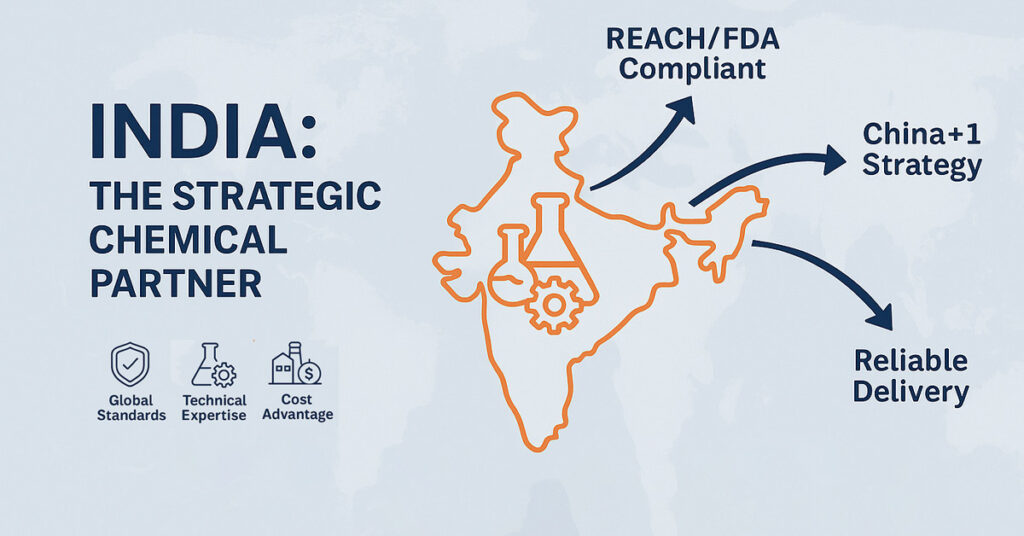India has become a favored sourcing and toll-manufacturing hub for specialty chemicals worldwide. Its cost competitiveness is a primary draw. Indian chemical plants benefit from extremely low labor and infrastructure costs – for example, labor rates can be under $2/hour(dated Aug ’25) and building a modern plant may cost only about one-third to two-thirds of a comparable Western facility. These savings allow Indian suppliers to offer much lower prices per kilo of product. At the same time, India has improved its regulatory and quality standards: leading Indian tollers and CDMOs now operate under international GMP and ISO systems. In fact, as one industry report observes, virtually all major Indian contract plants now meet global standards and often facilities are at least as good as, or better than, those in the West. Many Indian manufacturers also hold REACH and FDA certifications, reinforcing trust in product compliance.
Factors in India’s Favour
Supply chain disruptions and geopolitical risks have made companies diversify away from single-source imports. India’s large and diversified chemical sector (exporting to over 175 countries) positions it as a reliable secondary supply base. Global buyers also view India as a strategic “China+1” alternative. India offers “skilled labor at competitive prices” and a more favorable regulatory environment, making it the key “+1” in diversified supply. International purchasing teams gain further confidence from India’s government support (investment incentives like PLI schemes) and robust export infrastructure (ports, trade agreements) that help ensure timely delivery.
Cost-Effective Production
Wages, utilities and construction costs in India are far lower than in Europe or North America. For example, compared to the US, salaries and new-factory costs in India can be 40–60% lower. These savings translate directly into more competitive pricing for specialty chemicals.
Quality & Compliance
India now boasts a large number of internationally accredited plants. It “commands more than 20% of the global pharmaceutical supply chain” and even has the world’s highest count of US-FDA-approved facilities outside the US. In specialty chemicals, many suppliers are ISO 9001/14001 certified and compliant with standards like REACH and RoHS, giving buyers assurance on quality and regulatory compliance.
Flexible Capacity & Skilled Workforce
Indian producers often run facilities at relatively low occupancy, meaning they can accept new projects or increase output on short notice. The country’s dense network of chemical hubs also ensures access to a trained workforce. This agility lets buyers mitigate lead-time risks and adjust volumes as market demand changes.
Strategic Location & Diversification
As companies look to reduce reliance on any single region, India serves as an attractive alternate hub. India’s location offers supply routes to Europe, the Americas and Asia, improving supply chain resilience. Many global firms now require that one supplier in their chain be non-Chinese, further boosting India’s role.
Together, these factors make India a “safe bet” for global clients seeking reliable specialty chemicals. Indian toll manufacturers typically combine low cost, technical expertise, and a strong commitment to international standards – a blend that appeals to procurement heads, technical managers and strategic planners alike.
Reducing Supply Chain Risks with Reliable Toll Manufacturing Partners
Partnership with experienced toll manufacturers can dampen the impact of supply chain disruptions. Tollers are often structured to provide buffering and redundancy that lone in-house suppliers cannot. For example, many contract processors maintain advance stocking of critical intermediates and can leverage wide vendor networks when raw materials are scarce. If a primary feedstock source runs short or a logistics issue arises, a reputable toll partner will typically have contingency plans (alternate suppliers, extra inventory or split production sites) to keep your project moving.
This added resilience is documented by industry experts. A Specialty Chemicals feature explains that toll processors use their “large supply networks” and stockpiles to source scarce materials quickly during shortages. They also offer services like warehousing, labelling and traceability that end-to-end clients might lack, ensuring a smoother flow of goods. Tapecon likewise notes that outsourcing inherently “provides redundancy, business continuity planning, and access to broader supplier networks,” thereby cutting operational risk.
Buffering Against Disruptions
Toll manufacturers often hold extra quantities of raw materials and intermediates on hand, effectively serving as an extension of your inventory. In practice, they can rapidly adapt production schedules or re-route jobs internally if a shipment is delayed, making supply more robust
Consistent Delivery Performance
Specialized tolling plants typically have dedicated production slots for each client project. This means clients get more predictable lead-times and fewer scheduling surprises compared to managing a one-off batch in an overloaded facility.
Quality Assurance
Working with vetted toll partners ensures adherence to strict quality protocols. Because tollers are independently certified (ISO, GMP, Responsible Care, etc.) and audited by multiple customers, their outputs tend to be more reliable. This high quality reduces the risk of rejects or recalls, which are major supply chain events.
Geographic Diversification
A global firm might use toll partners in multiple regions (e.g. India, Europe) to hedge risks like regional power outages or political issues. This multi-location strategy is easier to execute when you have trusted tollers abroad ready to produce on your behalf.
In short, a dependable toll manufacturing partner acts like an insurance policy for your supply chain. You gain flexibility to handle raw material shortages, logistical hiccups or sudden demand changes – all without maintaining that agility yourself.


